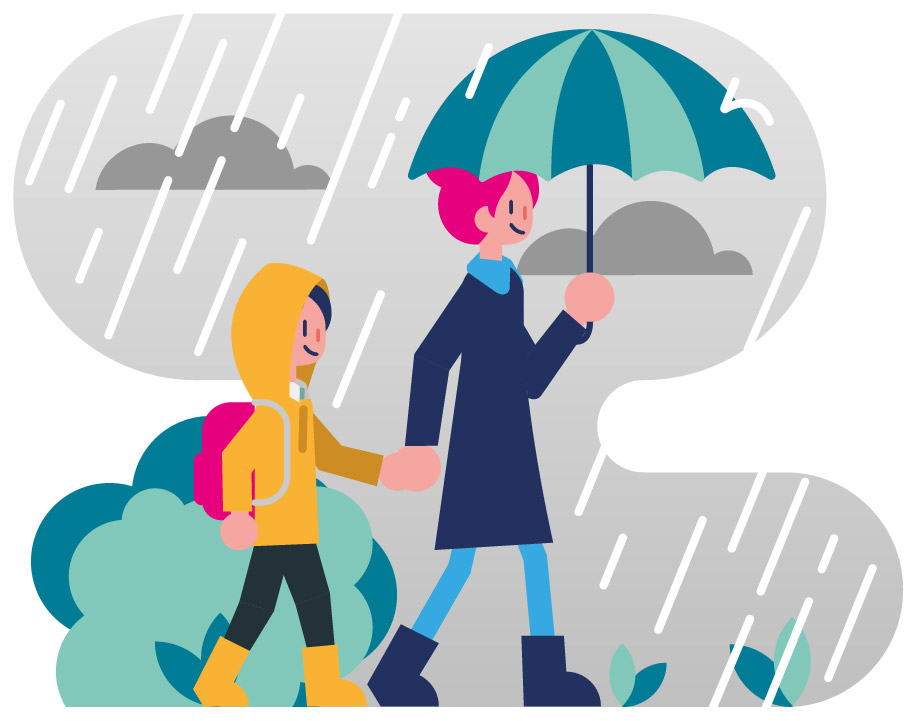
For schools
Norfolk County Council is working with partners to support schools in encouraging children to travel to school more sustainably.
There is no “one size fits all” in helping more pupils to cycle, walk, and wheel to school. The first step is usually to identify the existing concerns that are stopping more people from choosing an active school run.

Road safety
The Norfolk County Council Road Safety Team is responsible for organising road user education and activities. They offer FREE learning opportunities to schools, children in education and members of the public, with the aim of promoting positive road safety behaviours and skills when; driving, riding, cycling and walking. Schools are encouraged to complete a road safety active travel survey with a road safety co-ordinator to explore their active travel needs.
Helping you to become a Travel Norfolk school
The ‘Safe School Run Pledge’ is an initiative to promote responsible parking which will help keep our children safe when they are dropped off or picked up outside the school. The project invites parents and carers to sign the voluntary pledge, helping to ensure that drop off/collections at their School are as safe as possible.
TITAN (Travel Independence Training across Norfolk) offers young people and adults with additional needs targeted support to help them to become confident independent travellers.
We offer a range of opportunities, both in school and in the community, offering 1-2-1 training, supporting effective transition to travelling independently.
This is a free service and travel independence training has shown to have positive effect on the lives of the people we support. Successful travel training helps to:
- Develop life skills of trainees to become more independent, increasing confidence and self-esteem.
- Increase interaction with others and building important social skills.
- Open up more opportunities, such as greater access to education, training, jobs, volunteering, leisure and social activities.
- Provide greater freedom so trainees can be less reliant on their parents and carers for support.
To find out more or make referral please follow this link TITAN travel training – Norfolk County Council or email titan@norfolk.gov.uk
Making changes to the street and area around your school can create an environment that encourages children to cycle, walk, and wheel to school. Building an evidence base and gaining support from local residents and relevant stakeholders like local businesses, as well as permission from Norfolk County Council will be needed. Developing a group is often helpful with this. Street Design Guidance (arcgis.com) provides some advice and tools you can use.
Set up a walking bus whereby groups of students can walk together to school as a group, accompanied by adults.
Set up a bike bus whereby groups of students cycle together to school as a group, accompanied by adults. Note that if this is particularly complex or requires any changes to traffic management, this would no longer be a low cost option, so would need to consider how it could be funded.
Air quality signage – encouraging car users not to idle engines in the vicinity of the school.
Provide a shelter for parents waiting to collect their children
Onsite secure storage for parents to leave buggies while visiting schools/early years settings.
Cycle or scooter parking such as cycle pods, minipods, Sheffield stands or bike shelters on the school site.
Install a Notice Board for sustainable travel information.
Distribute travel to school information to new and prospective parents for example admissions letters or introductory letters from schools could provide link to www.travelnorfolk.co.uk and/or the schools own information about travel/transport.
Include a summary of travel plan; statements on school’s policy regarding travel and expectations on parents/students in the school’s prospectus.
Promote active travel at parents evening and induction evenings to highlight the facilities available at school and encourage parents to explore the options available for the journey to and from school.
Lining around the school for example the addition of school keep clear markings (sometimes referred to as zig zags) or other traffic management measures such as wig-wag lights, in order to prioritise pedestrians in the immediate vicinity of the school.
Feasibility studies – this would involve the use of external expertise to review the school site and any issues and situation (school support/leadership/where students travel in from etc) specific to that school. It would make a series of recommendations which could then be used as a basis for future funding bids (for example to Active Travel England) in order to improve travel issues.
On road murals or other eye-catching (school-specific) campaign or intervention (as per this Exeter example, could also be a possible intervention, however this would require additional investigation at any potential locations to confirm whether this would be appropriate, plus any ongoing maintenance costs would need to be covered.